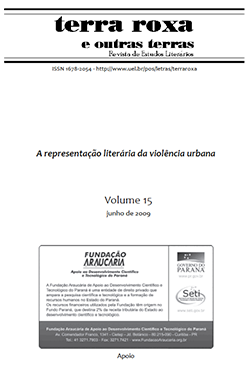Testimony and orality in Marcelino Freire's stories: the view beyond violence
DOI:
https://doi.org/10.5433/1678-2054.2009v15p28Keywords:
Violence, Marginality, Testimony, OralityAbstract
In the last decades the increasing urban violence has shown not only great changes in the social behavior as well as have influenced the culture. In the thought of violence lives the threat of the unexpected. The increasing interest for testimonial narratives carries the desire to obtain, by the others experience, the necessary knowledge to overcome chaos. I want to show how the testimonial and the orality in Marcelino Freire' stories provoke our mind to go beyond the show of violence.Downloads
References
FREIRE, Marcelino. Contos negreiros. São Paulo: Record, 2005.
MICHAUD, Yves. A violência. São Paulo: Ática, 2001.
ONG, Walter J. Oralidade e cultura escrita: a tecnologização da palavra escrita. Trad. Abreu Dobránszky. Campinas: Papirus, 1998.
PELLEGRINI, Tânia. "No fio da navalha: literatura e violência no Brasil de hoje". Regina DalCastagné, org. Ver e imaginar o outro: alteridade, desigualdade, violência na literatura brasileira contemporânea. São Paulo: Horizonte, 2008.
SARLO, Beatriz. Tempo passado: cultura de memória e guinada subjetiva. Trad. Rosa Freire d'Aguiar. São Paulo: Companhia das Letras; Belo Horizonte: UFMG, 2007.
SELIGMANN-Silva, Márcio. História, Memória, Literatura - O testemunho na era das catástrofes. São Paulo: Unicamp, 2003.
Downloads
Published
How to Cite
Issue
Section
License
Copyright (c) 2009 Terra Roxa e Outras Terras: Revista de Estudos Literários

This work is licensed under a Creative Commons Attribution 4.0 International License.
Authors who publish in this journal agree to the following terms:
a) The authors retain the copyright and grant the journal the right of first publication, the work being simultaneously licensed under the Creative Commons Attribution-NonCommercial 4.0 International License, allowing the sharing of the work with acknowledgment of the authorship of the work and initial publication in this journal.
b) Authors are authorized to assume additional contracts separately, for non-exclusive distribution of the version of the work published in this journal (eg, publish in an institutional repository or as a book chapter), with acknowledgment of authorship and initial publication in this journal.
c) Authors are allowed and encouraged to publish and distribute their work online (e.g. in institutional repositories or on their personal page) after the editorial process, as this can generate productive changes as well as increase impact and citation of the published work (See The Effect of Open Access).
d) The authors of the approved works authorize the journal to, after publication, transfer their content for reproduction in content indexers, virtual libraries and the like.
e) The authors assume that the texts submitted for publication are of their original creation, taking full responsibility for their content in case of any objection by third parties.



















